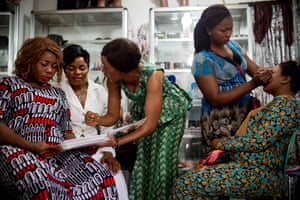Fatoumatah Bah is cornered. Sitting in front of a tinsel-ringed mirror in Miskaa Salon, her head is bent forward, two women at work braiding twists into her hair. She will be stuck in the chair for at least three hours.
It is a good moment to pounce. Fatoumatah Kamara, 20, an apprentice hairdresser in a matching skirt and blouse and glinting cherry earrings, sidles up to Bah. She starts to make conversation.
At first, it is the usual hairdresser chatter. What rain we’ve been having, eh? Where are you from? What are you up to this weekend? This is the 20-year-old accountancy student’s second visit to the salon in Guinea’s capital, Conakry.
Soon Kamara’s questions become more personal. Does Bah have a husband? A boyfriend? Then she goes in for the kill. Does she know there are ways of avoiding getting pregnant?
With every manicure, pedicure and hairdo at the Miskaa Salon, clients receive a free treatment: a great deal of contraceptive advice.
Related: Contraception and family planning around the world – interactive
Five salons across Conakry have been dispensing family planning advice since 2012, and they have been so successful that the project – the brainchild of Jhpiego, a health organisation associated with Johns Hopkins University in the US – is about to be extended to salons in Guinea’s seven major cities.
In Guinea, which has one of the lowest rates of modern contraceptive use in the world, women have an average of five children. According to UN figures, in 2015 only 7.5% of married or cohabiting women use some form of contraception.
A lot of effort has gone into teaching women in rural Guinea about family planning, but not so much in urban areas. A salon is an excellent place to reach them, so long as it is the right kind of salon.
“It’s better to go where they do braids because that’s what women traditionally want,” says Yolande Hyjazi, Jhpiego’s director in Guinea. “A woman who’s straightening or washing her hair has more money and more access to information.”
Across town from Miskaa, Jumelle Coiffure is trying to turn around clients as fast as possible, largely because the room is impossibly cramped. Jumelle is owned by 32-year-old twins Tata Sylla, wearing a short black and bright green wig, and her sister Mbalia, with long, heavy braids.
“There were a lot of young women getting pregnant around here when they didn’t want to, with lots of kids running after them, and I thought it would be good to teach them how to avoid that. Even my apprentices were getting pregnant,” says Mbalia, making up Aminata Kouma’s face just inside the salon door. Outside, a dozen girls huddle under the dripping overhang of the salon’s tin roof, filing fingernails and tugging at each other’s hair.

Kouma, 35, says she first heard about family planning at Jumelle.
“I never knew about this before coming here – they taught me how,” she said. “I got the injection, and since then I’ve been able to control the number of children I have. I already have four and I don’t want any more. My husband can’t afford it, school fees are so high. There’s too much suffering here. I’m a housemaid, but I’m out of work.”
Each salon has an army of apprentices, some of whom have worked in them for years, to cope with the intensity of the work and the number of clients. Jhpiego deliberately chose very popular salons to reach as many people as possible, and trained some of their apprentices as community health workers, to explain how to use exclusive breastfeeding to prevent pregnancy, talk about implants, sell pills and write referrals. They earn half the sale price for any pills and condoms they sell.
The trial started in 2013, but everything had to stop for the Ebola outbreak. Like all health organisations, Jhpiego had to turn its efforts to fighting Ebola. In any case, women were not going to the salon.
It is now back in full swing, though, and tailors’ shops are the next target. “There are women that wait around all day for their dresses, trying them on,” Hyjazi said. “People are being social, hanging around. But in the tailors’ shops we also have a lot of young men. Reaching men is important.”
The idea is that clients of both establishments will talk to their friends, and word will spread.
At Miskaa, a large wedding party is getting ready.
Apprentice hairdressers cluster around each client, carefully painting on long, black eyebrows, blow-drying hair straight, and making minute adjustments to towering, shiny headwraps.
Kamara, pointing at her laminated booklet, has just finished explaining how to use a string of beads to track fertility. But it isn’t new to Bah.
“I go on Google, I go on YouTube, I find information,” she says. “But not everybody is a student like me.”
She knew about condoms and pills, but not the other methods Kamara talks about. Young people have far more access to information than previous generations, and sex is slowly becoming something that is more talked about.

Traditionally, a Guinean woman would space out her children by leaving her husband and going back to her mother’s house for a few years, every time she had a baby.
“Now no one is using abstinence, so everyone is using contraceptives, but no one is talking about it,” Hyjazi says. “Many people think that if a women is using contraceptives, it’s because she has another partner. There’s not a lot of open communication – even between a husband and wife using them. Many women will use the pill without telling their husbands.”
One thing is unlikely to change, though, and according to Hyjazi, it is skewing the statistics, because people doing surveys do not always do them in private. “If a woman is asked if she’s using contraceptives and her mother or mother-in-law is there, she’ll never say yes.”
The wedding party is almost ready. Kamara looks over each woman carefully before opening the door for them. In a few hours, they have become more glamorous and, thanks to Kamara, more contraceptive-savvy.
“I like making women beautiful – that’s why I work here,” says Kamara, already looking around for her next quarry.
Conakry hairdressers dispense cut-and-dried contraceptive advice to women | Ruth Maclean
